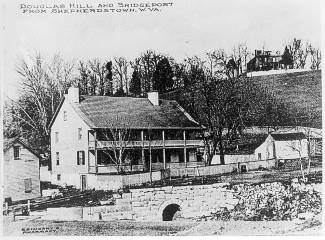Collection Name
About
This photograph provides an excellent view of the downstream end of a bypass flume that carried water past the lock. To keep the current as minimal as possible, canals are built on a series of levels with locks serving to raise and lower boats where the canal level is changed. However, it is still necessary to maintain a steady supply of water to all parts of the canal and the bypass flumes serve this purpose. Typically located on the berm side (i.e. land vs. river side) of most locks, the flumes carried water past the lock, helping to maintain the water level even if one of the lock gates was closed. While some bypass flumes had sluice gates to facilitate the regulation of water flowing through the flumes, others had slots into which locktenders could place beams to completely or partially close them off.
It was not uncommon for buildings to be constructed over the bypass flume as was the case here at Lock 38 where a store selling feed and other supplies stood. A corner of that building can be seen on the far left. Directly behind the bypass flume is a large, two and a half story structure known as the Ferry Inn or the Tavern House (only a bit of the foundations still exist).
Mile 72.8
NPS File 954
A lock is a chamber used to lift or drop water levels in order for a boat to move across elevation levels. There are 74 lift locks that rise 605 ft from Georgetown to Cumberland. The locks were tended by lockkeepers that would operate the locks for the canal boats that would arrive at any time of the day on their way either to Georgetown or Cumberland. Materials used to build the locks ranged from Aquia Creek Freestone, Granite, and Seneca stone to wood and cement on the upper composite locks. The locks would also be a place for canallers to trade or buy supplies that they would need for their long journeys.
